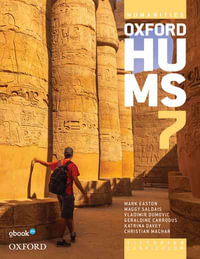
Mediation of Legitimacy in Early China
A Study of the "Neglected Zhou Scriptures" and the Grand Duke Traditions
By: Yegor Grebnev
Hardcover | 12 July 2022 | Edition Number 1
At a Glance
Hardcover
$155.75
Aims to ship in 15 to 25 business days
When will this arrive by?
Enter delivery postcode to estimate
Grebnev demonstrates the centrality of the Yi Zhou shu in Chinese intellectual history by highlighting its simultaneous connections to canonical traditions and esoteric Daoism. He also shows that the Daoist rituals of textual transmission embedded in the Grand Duke traditions bear an imprint of the courtly environment of the Warring States period, where early Daoists strove for prestige and power, offering legitimacy through texts ascribed to the mythical sage rulers. These rituals appear to have emerged at the same period as the core Daoist philosophical texts and not several centuries later as conventionally believed, which calls for a reassessment of the history of Daoism’s interrelated religious and philosophical strands. Offering a far-reaching reconsideration of early Chinese intellectual and religious history, Mediation of Legitimacy in Early China sheds new light on the foundations of the Chinese textual tradition.
About the Author
Yegor Grebnev is an associate distinguished research fellow at Beijing Normal University (Zhuhai) and an assistant professor at BNU-HKBU United International College. He was a junior fellow at the Society of Fellows in the Liberal Arts at the Southern University of Science and Technology in Shenzhen while this book was completed.
Industry Reviews
Hidden in plain sight in the Yi Zhou shu, Yegor Grebnev has discovered the missing link between "religious" and "philosophical" Taoism. His elegant and philologically rigorous demonstration that the two are fundamentally of one piece will necessitate the rewriting of current textbook accounts of Chinese intellectual history. -- Lothar von Falkenhausen, author of Chinese Society in the Age of Confucius (1000-250 BC): The Archaeological Evidence
Mediation of Legitimacy in Early China brings together two too-often overlooked sources to make fresh observations concerning the structure of early Chinese texts and what this structure shows about the process of their composition. It has far-reaching implications for understanding all aspects of the early Chinese literary tradition. -- Edward L. Shaughnessy, author of Unearthing the Changes: Recently Discovered Manuscripts of the Yi Jing (I Ching) and Related Texts
[This book] will provide to the field of early China studies a reliable and thoughtful introduction to the many historical and textual difficulties of an undeservedly underread text for many years to come....Grebnev's book is written on a deep foundation of rigorous and thoughtful research ... While offering honest and refreshing appraisals of some of the text-historical issues posed by the work ... he also provides groundbreaking insights into the ways that the Yi Zhoushu seems to have been integral to major political, religious, and intellectual developments in early and medieval China. * Journal of Asian Studies *
This volume is highly recommended to scholars of ancient Chinese texts, political authority, and the origin of Daoism. * Religious Studies Review *
Mediation of Legitimacy in Early China is a profoundly erudite work of sinology... a pleasure to read. -- Paul Nicholas Vogt, Indiana University * Journal of the American Oriental Society *
ISBN: 9780231203401
ISBN-10: 0231203403
Series: Tang Center Series in Early China
Published: 12th July 2022
Format: Hardcover
Language: English
Number of Pages: 368
Audience: General Adult
Publisher: Columbia University Press
Country of Publication: US
Edition Number: 1
Dimensions (cm): 23.49 x 15.55 x 3.4
Weight (kg): 0.68
Shipping
| Standard Shipping | Express Shipping | |
|---|---|---|
| Metro postcodes: | $9.99 | $14.95 |
| Regional postcodes: | $9.99 | $14.95 |
| Rural postcodes: | $9.99 | $14.95 |
How to return your order
At Booktopia, we offer hassle-free returns in accordance with our returns policy. If you wish to return an item, please get in touch with Booktopia Customer Care.
Additional postage charges may be applicable.
Defective items
If there is a problem with any of the items received for your order then the Booktopia Customer Care team is ready to assist you.
For more info please visit our Help Centre.
You Can Find This Book In
This product is categorised by
- Non-FictionHistoryRegional & National HistoryAsian History
- Non-FictionLiterature, Poetry & PlaysHistory & Criticism of LiteratureGeneral Literary StudiesClassical Literary Studies
- Non-FictionHistoryGeneral & World History
- Non-FictionReligion & BeliefsOther Non-Christian ReligionsAncient Religions & Mythologies
- Non-FictionReligion & BeliefsReligionHistory of Religion
- Non-FictionHistory
























